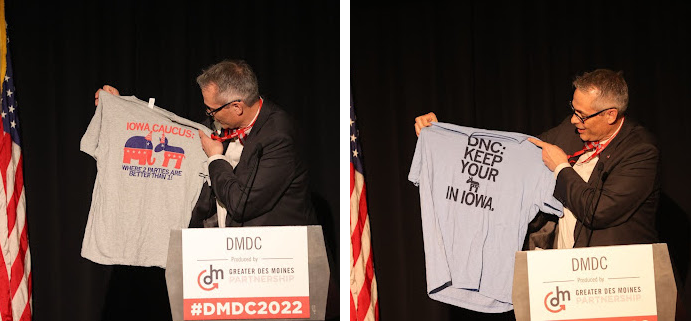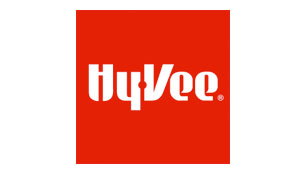Business leaders rally to #KeepIowaFirst in the presidential nomination season

MICHAEL CRUMB May 16, 2022 | 8:14 pm
6 min read time
1,331 wordsAll Latest News, Economic Development, Government Policy and LawJay Byers, president and CEO of the Greater Des Moines Partnership, unveils two T-shirts to promote keeping Iowa’s first-in-the-nation status in the presidential nominating process during last week’s visit to Washington, D.C. Photos submitted by the Greater Des Moines Partnership
#KeepIowaFirst. That’s the hashtag business leaders are asking people to use on social media about the upcoming decision by the Democratic National Committee on whether to retain Iowa’s first-in-the-nation status in the presidential nominating season.
The topic came up during last week’s DMDC 2022 trip by the Greater Des Moines Partnership to Washington, D.C., where they advocated for their federal policy priorities.
In a conversation with the Business Record, leaders talked about the important role the Iowa caucuses play in Iowa’s economy and in the nation’s efforts to elect a president every four years.
Republicans already plan to hold their party’s caucuses as usual in 2024, and they have come out in favor of Democrats keeping their lead-off caucuses in Iowa, too.
During the Washington trip, Partnership President and CEO Jay Byers unveiled two T-shirts made by Des Moines T-shirt shop Raygun. One read, “Iowa caucus: Where 2 parties are better than 1.” The other read, “DNC: Keep your [image of a donkey] in Iowa.”
He also revealed a top 10 list as to why Iowa’s status should be retained.
Byers was joined in the conversation by Scott Brennan, a former Iowa Democratic Party chair and an Iowa representative to the DNC; Scott Raecker, executive director of the Robert D. and Billie Ray Center at Drake University; and Joseph Jones, executive director of the Harkin Institute at Drake University.
Byers emphasized the economic impact the caucuses have on Iowa, saying the 2020 caucuses brought in $11.3 million to the Des Moines region.
“But the main reason we’re here is the role Iowa plays in terms of the national political scene and being able to drive those conversations of who’s going to be leading our country moving forward,” he said. “I think historically Iowa has done a very good job on the Republican and Democratic side in terms of vetting presidential candidates and leading that process, and we think it’s critically important more so than ever that we continue to play that role.”
Brennan said Iowa winnows the field of candidates and has been part of the four-early-state configuration that has chosen the winner of the popular vote in the last four elections.
“It is a process that has worked … and shame on us Democrats if, on the national level, we’re too myopic that we don’t recognize the value of that process,” said Brennan, a shareholder and attorney with the Davis Brown law firm in Des Moines.
The Iowa caucuses came under fire in 2020 after coding problems in a reporting app delayed results for several days.
Brennan said he thinks people are using the problems experienced in 2020 as a reason to target the Iowa caucuses.
“There’s been criticism, and 2020 was not our friend,” he said. “On the Republican side, in 2012 they had a disaster and it raised people’s awareness of the concerns about caucuses, so I think it’s just people looking for a reason to get after caucuses. But ultimately it’s good for Iowa.”
Raecker said that besides the business impact from the caucuses, this is an opportunity for both parties to work for a common goal of protecting Iowa’s first-in-the nation status.
“It gives Iowa one more way of demonstrating what civility looks like,” he said. “We don’t have the parties spiking at each other over this. They’re working together to try to make this happen.”
The Iowa caucuses are one of the few opportunities where candidates can experience that grassroots engagement with voters that can’t be found in other states, Raecker said.
“I don’t think other states that have big TV markets that don’t have the retail politics, that don’t have the same elevation of civility element that this has,” he said. “This gives us an opportunity as Iowans to demonstrate to the world what civility looks like. Are we there yet? No. Can we get better? Yes. But if we don’t have the opportunity to do it, we can’t show the world how best to do it, and I think Iowa is the place to do that.”
Jones said the Iowa caucuses also provide an education in civil literacy as neighbors get together and discuss politics, even if they’re on different sides of an issue.
“You don’t see that in a lot of places where people go into a voting booth and that’s it,” he said. “They could not fathom talking to their neighbor down the street about the person they are supporting or why they want an issue addressed, and I think that’s really important.”
Jones argued that other states don’t have the stamina to withstand the onslaught of candidates in the months leading up to caucuses.
“It’s also the capacity of the people that engage in the process who have the will and the stamina to do the hard work of learning the issues and talking to people, and we exemplify that for a lot of people,” he said.
The caucuses also raise awareness of Iowa through media exposure, and what the state has to offer, whether it’s restaurants and coffee shops or other amenities and recreational opportunities.
“It’s definitely one of the big advantages in terms of the ability to showcase our region and the rest of the state not only to candidates, but really the rest of the country and the rest of the world in many ways,” Byers said. “It’s that storytelling opportunity for us as a region and a state.”
He countered arguments made against Iowa’s keeping its status, saying caucus turnout, which he said was 30% in 2020, is almost double that in other states, and that Iowa is more diverse than people think.
“We’ve been the fastest growing major metro in the Midwest, and a big part of that has been fueled by diversity,” he said. “Our minority population over the past decade grew 94% and our foreign born population grew by nearly 50%, the second-fastest growing in the Midwest. So we have become much more diverse.”
Brennan said that from a political perspective, the caucuses bring an element to the early process, which is rural, working class voters who are integral to a candidate getting elected.
“The way this country is set up, if you can’t win in the Midwest, then you don’t get elected president,” he said. “If as Democrats we don’t do that, we’re doomed to electoral wilderness, and the way the Senate is set up, we’ll be in the minority in the Senate forever, so I think those are reasons to stay with the process.”
Raecker said while he agrees with Brennan and Byers, Iowa is going to have to make its case differently for first-in-the-nation caucuses than it has in the past if it’s going to be successful.
“I believe when the Iowa Democratic Party is submitting why Iowa first, it’s going to be more than a small, closely held group of Democratic leaders making that case,” he said. “They’re going to be making the case on the behalf of Iowans who will be rallying around that this is valuable to vet out candidates with an intelligent and articulate electorate who shows up, asks the tough questions and then shows up and discusses it in a caucus.”
Raecker said civility, the state’s educated electorate and Iowa’s rural base all play a role in why Iowa should be first.
“There’s always conversation about protecting Iowa’s first-in-the-nation status, but this year is different because they’ve opened up the process in one of the parties and we have to show a coalesced, bipartisan effort of the significance of the caucuses. And that’s for the betterment of our country, and the world, because you still have to come to Iowa and be a retail candidate and answer tough questions, and Iowans take that seriously.”










